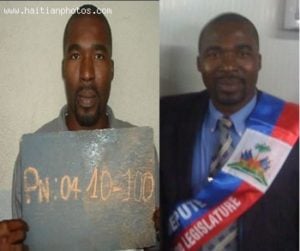 The apprehension and brief detention of a sitting legislator last Thursday was a prelude to looming political paralysis that also served as a catalyst for change, engaging citizens in substantive debates about institutional corruption decaying Haiti’s political and judicial systems.
The apprehension and brief detention of a sitting legislator last Thursday was a prelude to looming political paralysis that also served as a catalyst for change, engaging citizens in substantive debates about institutional corruption decaying Haiti’s political and judicial systems.
The national consciousness came to life after government Commissioner Felix Leger ordered the national police to apprehend and remand Deputy Arnel Belizaire, returning from a diplomatic mission in France. According to the commissioner, the deputy came up on Haiti’s most wanted list as a fugitive and needed to return behind bars immediately. Acting on his orders, UN troops assisted the police in staging barricades around the airport even denying House President Sorel Jacinthe access to Airport Toussaint Louverture’s diplomatic room. Within minutes of his plane landing, police intercepted the deputy enveloped in his constitutional immunity, and transported him to Port-au-Prince’s notorious Penitencier Nationale, the capital’s civil detention facility.
Subsequent reactions that flooded both national and international spheres were not short of shock, anger and dismay. Legislators vowed retaliatory measures with resolutions threatening to decapitate Martelly’s new government and even impeach the president. Meanwhile, legal and judicial scholars disagreed on the constitutionality of the commissioner’s decision and police actions toward a sitting member of parliament. While some did not condone the practice on principle, others, in the minority, voiced support for the government’s unprecedented actions to eradicate corruption in Haiti, emphasizing immunity did not mean impunity.
Still, another category of people put the spotlight on institutional human rights abuses, a weapon of choice for leaders deliberately targeting individuals deemed undesirable, to quell free speech and/or intimidate the press. “We need a political decision to stop this premeditated drift that can endanger the freedom of any citizen who dares criticize the actions of the head of state since the arrest of the deputy is also an act of intimidation,” wrote Jhon Picard Byron, a professor at the State University of Haiti. He expressed the need for the parliament to punish actions he judged detrimental not only to the Constitution, but also to the country’s democratic achievements.

Deputy Arnel Belizaire
Due to high media coverage and widespread protests over the controversial arrest, the police freed Deputy Belizaire in less than 24 hours; however, that was hardly the norm for thousands of Haitians detained legally or otherwise. In fact, the National Human Rights Defense Network (RNDDH French acronym) recently published “Impacts of Prolonged Pretrial Detention on the Haitian Society,” a survey that examined how family members coped with prolonged and illegal detentions of their loved ones. The RNDDH concluded, “The survey results show once again that prolonged pretrial detention is systemized by the mayors, and to a lesser extent, by the government commissioners that exhibit acute indifference to the law guaranteeing the presumption of innocence of every individual.”
Many people ended in jail without warrants, proper charges or timely arraignments; thus, remained voiceless with no representation while family members, broken and scattered, struggled to survive. “The recent estimates confirmed that 70.33 percent of the Haitian prison population is awaiting trial,” the report said. “In this figure, a large majority is in prison for many years in situations of prolonged pretrial detention.” RNDDH’s report also revealed some alarming statistics from Haiti’s civil detention facilities. While 7254 people made up the country’s civil prison population, only 2152 were tried. The majority of detainees, some 5102 people, sat in prison hoping to someday see a judge.
This vile practice, strictly prohibited by judicial laws, had alarming psychological effects on families who depended on incarcerated family members for survival. “Some children returned to rural areas, hometowns of their incarcerated parents, while others are found roaming the streets, multiplying the number of street children,” indicated the report. “Others are collected by relatives and friends who often exploited them sexually and domestically,” insisted the study that attributed culpability to carefree leaders it concluded “had no respect for the nobility of the function assigned to them.”
As frustration flooded the airways over what is now known as the Belizaire Affaire, addressing human rights abuses at the structural level became the underlying theme for intervening leaders in the civil community. Urging legislators to benchmark the current political crisis as a breaking point with the counterproductive system and take the country in a new direction, leaders pointed out the deputy’s arrest would, like thousands of other cases before it, go unnoticed absent his high profile status .
“We must seize this opportunity to build a case around the problems that threaten the sovereignty of the country to signal a complete rupture with the current system,” recommended Lawyer and political analyst Rene Julien on Moment of Truth, a radio show aired on station Signal FM. “Every crisis presents new opportunities,” he added.